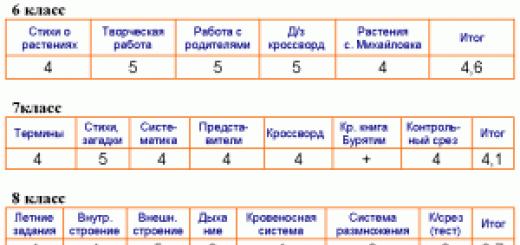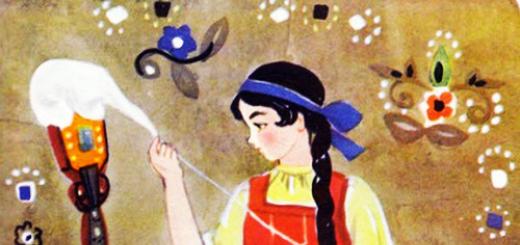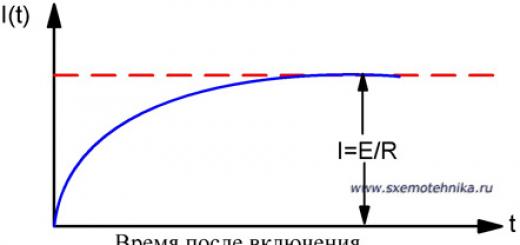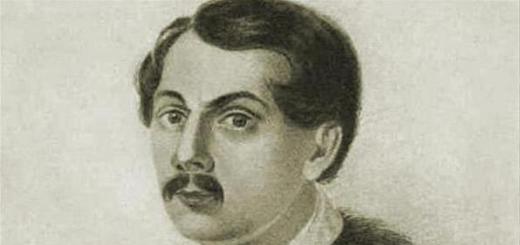“Whoever says that war is not scary knows nothing about war...” (Yu. Drunina)
War is the most terrible test that both each individual and the entire country as a whole can go through. Families are forced to say goodbye to their fathers, brothers and sons, not knowing whether they will return home. Unfortunately, sometimes not only men, but also women are forced to be on the front lines, one of these women was the author of this statement, Yulia Drunina. Still a very young girl, having just graduated from school, Yulia voluntarily signed up as a nurse with the Red Cross.
"I left my childhood for a dirty heated car,
To an infantry echelon, to a medical platoon.
I listened to distant breaks and did not listen
Forty-first year, accustomed to everything..."
She went through the entire war, despite repeated wounds, one of which was so serious that it could lead to death.
Julia began writing poetry at the age of eleven and continued throughout her life. Most of her work is devoted to this terrible topic, which left an indelible imprint on her soul - war.
The Great Patriotic War was reflected in the works of many poets and writers and still remains a relevant and topical topic, because, as the slogan says, “no one is forgotten, nothing is forgotten.” But is it so important for us, modern people, to remember what happened more than half a century ago? It is very difficult for modern people to imagine the conditions in which our ancestors defended their homeland; for some, their motives may seem absurd and incomprehensible. I, however, do not agree with this opinion. The memory of those who died in this bloody war, as well as those who went through it and survived, should live forever in the hearts of everyone. Thanks to these people, we can live in a free country, enjoy everything that our enemies could have taken from us. But we can’t even imagine what everyone had to go through. No matter how brave a person is, the knowledge that he is going to certain death will instill fear in anyone. It was not by their own decision that they were forced to leave their usual lives and take up arms to defend our homeland. Despite the horror that undoubtedly gripped everyone, no one had a thought about giving up, turning back, avoiding what might be the final battle. People were inspired by the general idea - victory over the enemy and nothing and no one could stop the heroes on their way.
Today, people of all generations remember and thank the soldiers of the Red Army, the people who provided medical care, even those who worked in factories and brought victory closer to the rear. So, several years ago a movement called the “Immortal Regiment” was organized. His idea is to carry a portrait of his relative who took part in the Second World War.
Yulia Drunina
Yulia Drunina: “Who says that war is not scary? "...
Yulia Drunina was born in Moscow, into the Drunin family of teachers. The father worked as a teacher at a school where his daughter Yulia also came as a first grader. She felt very comfortable at school, and at the age of 11 she began writing poetry, albeit ineptly, but with feeling. The war ruined everything; on June 22, 1941, Yulia ran to the military registration and enlistment office: “Take me to the front!” I was not taken into the army immediately, but in the same 1941.

I left my childhood for a dirty car,
To an infantry echelon, to a medical platoon.
I listened to distant breaks and did not listen
Forty-first year, accustomed to everything.
I came from school to damp dugouts,
From the Beautiful Lady to “mother” and “rewind”,
Because the name is closer than "Russia"
I couldn't find it.
She was a battalion medical instructor. A subtle and sublime nature, she early went through the school of true courage. And the “dirt of war” will ring an alarm bell in her poems for many years to come.
We stood by the Moscow River,
The warm wind rustled her dress.
For some reason, suddenly out of hand
You looked at me strangely -
This is how they sometimes look at strangers.
He looked and smiled at me:
- Well, what kind of soldier are you?
How were you really during the war?
Did you really sleep in the snow?
Having a machine gun installed in your heads?
You see, I just can't
Let me imagine you in boots!..
I remembered another evening:
Mortars were fired and snow was falling.
And he told me quietly dear,
A person similar to you:
- Here we are, lying and freezing in the snow,
As if they never lived in cities...
I can't imagine you
In high heels!..
There are poets for whom it is enough to write two or three lines in order to be remembered! But the main thing is that these lines come from the heart, touching the feelings and experiences of millions of people. Yulia Drunina completely succeeded. Even without knowing the authorship, several generations of Soviet people can accurately read four lines of Yulina’s poems:
I've seen hand-to-hand combat so many times,
Once in reality. And a thousand - in a dream.
Who says that war is not scary?
He knows nothing about the war.
This quatrain was written in 1943, when there was no end in sight to the war. When the 19-year-old poetess herself was “marked” by fragments of the war, she was wounded several times. She fought until November 21, 1944, when she received the document “...unfit for military service.” She returns to Moscow, goes to the Literary Institute, but is denied admission. Then she comes with the students to the lecture and stays here. No one dared to refuse her. And how can you refuse her? To a front-line soldier? Although, looking at this fragile girl, many could not believe that she had returned from the hell of fighting.
I brought it home from the fronts Russia
Cheerful contempt for rags -
Like a mink coat I wore
His burnt overcoat.
Let the patches on the elbows bristle,
Let your boots get worn out - no problem!
So elegant and so rich
I've never been there later...
The old tape is charred wood.
Young Aleinikov, young Bernes.
The daughter says: “Primitive”!
Maybe there is truth in these words,
Only courage, and loyalty, and honor -
Enduring motive.
They were developed on film by the war...
How tired I am of halftones -
As if we are afraid of strong passions
The way they fear uninvited guests...
The old tape is a charred forest,
Bernes sings “Dark Night”.
Oh, how exciting the simple motive is,
How “primitive” conquers hearts!
Yes, she remained the same girl at heart, albeit broken by the war. And she dreams of love, of a strong and strong man’s shoulder no less than her grown-up daughter
Call me! I'll drop everything.
January hot, young
Sweeps up heavy powder
Light marks.
Fresh fluffy meadows.
Lips. The heaviness of weakened arms.
Even the pines, drunk from the snowstorm,
Spun with us in the wind.
Snowflakes are melting on my lips.
Legs move apart on the ice.
A brisk wind, scattering the clouds,
He shook the cheerful star.
It's good that the stars swayed
Good to carry through life
Happiness untouched by a bullet
Loyalty, not forgotten along the way.
She meets a new love - playwright Alexei (Lazar) Kapler, for whom Svetlana Alliluyeva once pined so much, and Stalin reproached her: “Look at him, all the women are running after him, what do you see in him?” Kapler returns the love. Maybe in some ways “old-fashioned”, incomprehensible to the new generation.

Now they don't die of love -
mocking sober era.
Only hemoglobin in the blood drops,
only for no reason does a person feel bad.
Now they don't die of love -
Only the heart is acting up at night.
But don’t call the ambulance, mom,
The doctors will shrug their shoulders helplessly:
“Now they don’t die of love...”
They spend a lot of time together, although both understand perfectly well that this love is pretty much covered with clusters of autumn, a thin silver web draped over the leaves that are already ready to turn purple...
How abruptly the day began to decline!
In autumn, every ray is sweeter...
Silver trumpets are sad
Farewell cranes.
How suddenly life has declined!
In autumn there are roads every hour...
I kiss your lips like that -
As if for the last time..
Kapler dies first. In 1979. Julia grieves heavily over the loss, but she lives and fights. She was on the crest of the struggle in that impulsive and “shaky” 1989, when the truth poured out of all the cracks. Yulia was elected to the Supreme Soviet of the USSR in 1990. When asked why she ran for office, Drunina once replied: “The only thing that prompted me to do this was the desire to protect our army, the interests and rights of participants in the Great Patriotic War and the war in Afghanistan.”
But it's not that simple. The once mighty country is falling into the abyss. And Julia cannot survive this. She climbs into her garage, turns on the car engine... It happened on March 21, 1991. And we are left with her poems:
Don't date your first love
Let her remain like this -
Sharp happiness, or sharp pain,
Or a song that fell silent across the river.
Don't reach for the past, don't -
Everything will seem different now...
Let at least the most sacred
Remains unchanged in us.
Whoever says that war is not scary / knows nothing about war
From the poem “I have only seen hand-to-hand combat once” (1943) by front-line poetess Yulia Vladimirovna Drunina (1924-1991):
I've only seen hand-to-hand combat once.
Once in reality and hundreds of times in a dream.
Who says that war is not scary?
He knows nothing about the war.
Allegorically: about the true appearance of a real, non-fictional war.
- - ideological, political and moral-psychological influence on the personnel of the Armed Forces and the population of warring countries in order to undermine their morale. Contents I. b. and its character are determined by social and...
Glossary of military terms
- - the condition “free from capture and arrest” in the insurance policy and conditions of the charter about the behavior of the captain of the ship in the event of a declaration of war between countries, one of which is under the flag of which...
Marine dictionary
- - 1968, 90 min., b/w, w/e, 2v. genre: drama. dir. Viktor Tregubovich, screenwriter Viktor Kurochkin, Viktor Tregubovich, opera. Evgeny Mezentsev, artist. Semyon Malkin, comp. Georgy Portnov, sound. Irina Chernyakhovskaya...
Lenfilm. Annotated Film Catalog (1918-2003)
- - a condition that determines the action of the parties in the event of war or the threat of war, hostilities, civil war and other military risks...
Large economic dictionary
- - a special clause, a condition of the contract that determines the action of the parties in the event of war or the threat of war, hostilities, civil war and other military risks...
Encyclopedic Dictionary of Economics and Law
- - about ending the quarrel...
Live speech. Dictionary of colloquial expressions
- - WAR, -Shy, plural. wars, wars, wars,...
Ozhegov's Explanatory Dictionary
- - like a soldier, like a military man, i.e. adapting to circumstances Wed. We spend our time as best we can, but in war it’s like in war.....
- - Powerful, although not in purple! Derzhavin. Waterfall...
Mikhelson Explanatory and Phraseological Dictionary
- - In war, as in war - like a soldier, like a military man, that is, adapting to the circumstances. Wed. We spend our time as best we can, but in war it’s like in war.....
Michelson Explanatory and Phraseological Dictionary (orig. orf.)
- - See HAPPINESS -...
IN AND. Dahl. Proverbs of the Russian people
- - Sib. Die in battle. FSS, 128...
- - Sib. Fight. SKuzb., 155...
Large dictionary of Russian sayings
- - TO THE WORLD - PEACE, TO WAR -...
Dictionary of Russian argot
- - adj., number of synonyms: 2 did not fight, did not smell gunpowder...
Synonym dictionary
- - adj., number of synonyms: 2 peaceful non-combatant...
Synonym dictionary
“Whoever says that war is not scary / knows nothing about war” in books
Chapter X LIFE, OR IN WAR - AS IN WAR
From the book Cases. Jokes. Aphorisms author Ranevskaya Faina GeorgievnaChapter X LIFE, OR IN WAR - AS IN WAR I understood what my misfortune was: rather a poet, a home-grown philosopher, an “everyday” fool - I don’t get along with everyday life. I am a freak. Faina Georgievna Ranevskaya did not fight everyday life - she tried to overcome it. Cleaning, food, clothing - all this turned into a nightmare
Chapter 11 IN WAR AS IN WAR
From the book of Khrushchev. Creators of terror. author Prudnikova Elena AnatolyevnaChapter 11 IN WAR AS IN WAR There is no trick against crowbar... if there is no other crowbar. Proverb Now, finally, we have found the reason for the appearance of bloody order No. 00447. This was the response of the “inner party” to Stalin’s bloodless attempt to deprive it of power. Graceful fencing
Chapter 4 In war as in war
From the book General Margelov author Smyslov Oleg SergeevichChapter 4 In war as in war On July 22, 1941, Major Margelov arrived in Leningrad. They were expecting him at Smolny at 18:00. Having now wandered around the front-line city, Vasily Filippovich arrived at the appointed time to the chief of staff. He didn't speak for a long time. Time was running out. After
Chapter 17 IN WAR AS IN WAR
From the book by Somerset Maugham author Livergant Alexander YakovlevichChapter 17 IN WAR AS IN WAR Nelson Doubleday, who met Maugham arriving from London on October 11, 1940 at the New York airport, said that the writer, getting off the plane, first of all asked for a glass of aged whiskey, drank in one gulp, and then took it out
Was it scary during the war?
From the book Direct Fire at the Enemy author Kobylyansky Isaac GrigorievichWas it scary during the war? I do not believe that among people with a normal psyche there are those about whom it can be said that they do not know the feeling of fear. In any case, everyone with whom I was close in battle did not belong to this category of people. Another thing is how they behaved in
"It's scary to be at war"
From the book Speeches of the Dumb. Daily life of the Russian peasantry in the 20th century author Berdinskikh Viktor Arsentievich“It’s scary to be at war” Stepanova Margarita Semenovna, 1922, Nolinsk, nurse I graduated from courses for military field surgical nurses and went to the front. We, young nurses, still didn’t know and couldn’t do much, but we had very good comrades at the front. They helped us too
Part III Cynical old age: “In war, like in war!”...
From the book The Great Tamerlane. "Shaker of the Universe" author Nersesov Yakov NikolaevichPart III Cynical old age: “In war, like in war!”...
Chapter 16 1914 Refutation of some statements regarding my position on the issue of our participation in the war. - Imperial manifesto on war. – The people are rallying around the throne. – Patriotic scenes in Moscow. – Offensive in East Prussia. – Battle of Tannenberg. - Polish campaign. – In Ro
From the book My Mission in Russia. Memoirs of an English diplomat. 1910–1918 author Buchanan GeorgeChapter 16 1914 Refutation of some statements regarding my position on the issue of our participation in the war. - Imperial manifesto on war. – The people are rallying around the throne. – Patriotic scenes in Moscow. – Offensive in East Prussia. – Battle of
32 About the Ilion War at Tevtamos and the participation of our Zarmayr with a few (warriors) together with the Ethiopian army and about his death in this war
From the book History of Armenia author Khorenatsi Movses32 About the Ilion War at Teutamos and the participation of our Zarmayr with a few (warriors) together with the Ethiopian army and about his death in this war Your curiosity causes us anxiety during our work, demanding two things - both brevity and speed of the narrative, which would, to
Whoever says that war is not scary / knows nothing about war
From the book Encyclopedic Dictionary of Catchwords and Expressions author Serov Vadim VasilievichWhoever says that war is not scary / knows nothing about war From the poem “I only saw hand-to-hand combat once” (1943) by front-line poetess Yulia Vladimirovna Drunina (1924-1991): I only saw hand-to-hand combat once. Once in reality and hundreds of times in a dream. Who says that in war there is no
Stalbek Asakeev. In war as in war
From the book Border Guards in the Afghan War author Musalov AndreyStalbek Asakeev. In war as in war Recorded by Andrey Musalov A large period of my life from 1979 to 1986 is connected with Afghanistan. I had the opportunity to spend six years in that war. And every day of those six years could have been the last. I was born in 1953, in the Kirghiz SSR, in Issyk-Kul.
Answer to terrorists: in war as in war
From the author's bookAnswer to terrorists: in war as in war Russia was late in the fight against the rebellion. Perhaps forever. While the public consciousness was shaken by the terrible terrorist acts taking place either in the capital or in the North Caucasus, government speakers were talking about war and the need
War is not like war / Politics and economics / Exclusive
From the book Results No. 17 (2012) author's Itogi MagazineWar is not like war / Politics and economics / Exclusive War is not like war / Politics and economics / Exclusive It is more profitable for Americans to pay a million dollars to the enemy’s military leader than to fight against him. Few? They'll give you 100 million! It will happen anyway
In war as in war / Politics and economics / Those who...
From the book Results No. 30 (2013) author's Itogi MagazineIn war as in war / Politics and economics / Those who... In war as in war / Politics and economics / Those who... There will be fewer imprisonments and fines. Not much, but still. According to Itogi, one of the high-profile legislative
From the book Newspaper Tomorrow 801 (13 2009) author Zavtra NewspaperAlexander Prokhanov AT WAR AS AT WAR
WHO SAYS THAT WAR IS NOT SCARY,
HE KNOWS NOTHING ABOUT THE WAR
Leading
War... Only when this word is pronounced, the heart is filled with fear, the fear of losing family and friends, the fear of losing the Motherland. War... This word echoes from the deep past, bringing horror to many generations. “Who says that war is not scary,” asked Yulia Drunina.
I've seen hand-to-hand combat so many times,
Once in reality. And a thousand - in a dream.
Who says that war is not scary?
He knows nothing about the war.
This quatrain was written in 1943, when there was no end in sight to the war. When the 19-year-old poetess Yulia Drunina herself was “marked” by fragments of the war, she was wounded several times. She fought until November 21, 1944, when she received the document “...unfit for military service.” She returns to Moscow, goes to the Literary Institute, but is denied admission. Then she comes with the students to the lecture and stays here. No one dared to refuse her. And how can you refuse her? To a front-line soldier? Although, looking at this fragile girl, many could not believe that she had returned from the hell of fighting.
The old tape is charred wood.
Young Aleinikov, young Bernes.
The daughter says: “Primitive”!
Maybe there is truth in these words,
Only courage, and loyalty, and honor -
Enduring motive.
They were developed on film by the war...
How tired I am of halftones -
As if we are afraid of strong passions
The way they fear uninvited guests...
The old tape is a charred forest,
Bernes sings “Dark Night”.
Oh, how exciting the simple motive is,
How “primitive” conquers hearts!
Seventeen-year-old girls worked as nurses on the battlefield, rescuing wounded soldiers under a retinue of bullets. We spent the night in the trenches, in the forest in the snow. Thanks to their exploits, many lives were saved. The author admires the courage of these girls:
Turning pale,
Gritting my teeth from the crunch,
From the native trench
One
You gotta break away
And the parapet
Jump under fire
Must.
After all, you can't pretend
Before myself,
What don't you hear in the night?
How almost hopeless
"Sister!"
Someone is there
Under fire, screaming...
War is a terrible manifestation of the cruelty of those who start it. There are no winners in war. All parties suffer. Everyone suffers losses. In order not to repeat the mistakes of the past, it is necessary to remember the horrors of war and maintain peace by all means. So that future generations will always live under peaceful skies.
The song “Clouds in Blue” is playing
Leading
The song “Oh, these clouds in blue” from the film “Moscow Saga” performed by Kristina Orbakaite is a modern composition, but there is a legend that the basis of the song was written in 1942, and composer Alexander Zhurbin found the score in the archives. This is not so, as the composer himself confirms. Authors (text) of words: Aksyonov V., Sinyavsky P.
The film "Moscow Saga" is a film adaptation of the novel of the same name by Vasily Aksenov, directed by Dmitry Barshchevsky, script by Natalya Violina. Alexander Zhurbin, who was still living in America at that time, was ordered a song for the film, he composed a waltz and played it over the phone to Russia. Pyotr Sinyavsky wrote words for the melody based on the novel. In the novel itself, the poem about clouds in blue is mentioned, but its text is not in the novel.
There is another song by Zhurbin in the film, heard in passing and not fully performed by Olga Budina - “Guests were coming to the dacha” (the words were written by Zhurbin’s wife, translator Irena Ginzburg, and she sang the full version in the TV show “Life is Beautiful” on the CTC channel on August 14 2005).
Leading:
“Pre-war Waltz” is a real tragic story from the life of Soviet citizens, especially the inhabitants of Brest. The song is entirely dedicated to the calm pre-war days and memories of these cloudless moments. Pre-war normal times are briefly described here. The running of trams, a film about the Volga in a cinema, the living faces of loved ones - all this was safe and sound before the Great Patriotic War. The interesting thing is that there was nothing to indicate the coming tragedy.
This song is essentially a memoir of a peaceful, carefree life. It stands before our eyes even during many war years.
The author of the words to the song was the talented poet F. Laube. The famous composer P. Aedonitsky set his poems to his music. The author was able to create a text sad enough to convey the grief of war. Aedonitsky designed this song text with beautiful tragic music of a heartbreaking nature. An interesting composition performed by Kobzon became the most popular version of the “Pre-War Waltz”.
“Peaceful sky over the Brest fortress,
Still alive, still alive...
The song "Pre-War Waltz" is playing
Leading:
Many old songs about the war have survived to this day. From the era of the VIA we have heard the best works by Lev Leshchenko and Joseph Kobzon, which glorify the Soviet military who won an incredibly difficult and bloody victory. So Olga Voronets’ hit has survived to this day without losing its soulfulness. “The Ballad of Colors” forever captures the memory of our grandfathers and great-grandfathers, front-line soldiers, who at the cost of their lives, health and youth paved the way for their descendants to a safe life and freedom.
It's nice to hear patriotic memorable hits like this. This composition glorifies the scene of the farewell of family members before being sent to the front. Mom walked her children to the train. Both sons fought to the bitter end. The sadness will dissipate when the plot tells about the happy ending of such a separation. The mother was lucky, one in three villages. Both sons returned home from the war safe and sound. They have everything intact, and they brought home a lot of awards. Only now the guys' hair is covered with gray. It's gloomy to hear about their comparison with "deadly whiteness." It’s a pity that there were a lot of such young people in our country. Lost youth, however, was not even discussed. Everyone was glad that their relatives returned home alive.
Special words should be said about the sad music of this hit. Songs dedicated to the participants of the Great Patriotic War almost always had a calm sound content. And the words almost always present a sad plot. It is very sad to listen to such songs of Victory for those who lost their loved ones during the Second World War.
The song “Ballad of Colors” is playing
Music: O. Feltsman Words: R. Rozhdestvensky
Leading:
Songs of the war years, as well as those written after the war but dedicated to those difficult years, sound no less poignant today than before. They are a tribute to the memory of those who died, and a gift to those who survived the tragic years of the Great Patriotic War. “Dark Night”, “Let’s Light a Smoke”, “Wait for Me” and many other songs written during the Great Patriotic War are true masterpieces of musical lyrics.
Great Patriotic War 1941-1945 was an incredibly difficult test for our people, army, and state. However, despite the huge losses, the feeling of rightness and justice of their cause caused a colossal surge of creative energy.
“If there were no war” is an entirely military song, describing in a manner typical of many hits of that time the whole vague picture of the combat burden for the people of the USSR. The composition was released back in 1983. For the third decade now, she has been giving us her beautiful lines in poetry and melody. Its verbal part was performed by Igor Shaferan. The music for the hit was written by Mark Minkov. Together they made a pretty good musical composition.
The lyrics of the hit talk about the suffering of a woman in separation from her beloved. The guy went to war. This confused the woman, because at any moment the war could take her lover away from her forever. She dreams that there will be no war. The composition is replete with women's feelings and experiences. The words of the hit title are repeated many times in this composition. This leads to the fact that its main goal is clear to almost every listener.
To date, several variations of its execution have been performed. The most famous of them is the version performed by Tolkunova. A female singer sings about military love like no other.
The song “If there were no war” is playing
Music: Mark Minkov Lyrics: Igor Shaferan
Leading:
The song "Ogonyok" is a famous Soviet military composition. The author of the words for it was Mikhail Isakovsky. The author of the music for the hit remains unknown. The song is confidently considered folk.
The lyrics of the hit tell us about a guy who went to the front. Memories of his dear beloved actively help him fight in battles for the Soviet Motherland.
The exact date of the hit is not known. What is clear is that its text was published on April 19, 1943. It was published in the newspaper Pravda. The poem by Mikhail Isakovsky was called that way. Various Soviet talents, composers and musicians began to compose music for these words. Among them were M. Blanter, N. Makarova, as well as L. Schwartz and A. Mityushin. Amateurs also tried themselves: N. Chugunov, as well as V. Nikitenko. The melodies they created had nothing at all similar to the one that gained wide popularity.
The song "Ogonyok" is playing
Leading:
This romantic composition was released thanks to individual talents. The music for the hit was written by composer M. Fradkin. The lyrics for the song were created by the famous Soviet poet E. Dolmatovsky. Together these people created a very tender and lyrical musical hit on a military theme. In addition to romance, the song also contains sadness, because the hero is forced to say goodbye to the beautiful lady at the end of the night. Being far from his own home on a military campaign, the soldier feels with all his heart longing for his homeland. This region is alien to him. Contrary to this, he gets a moment of feeling of homeland, thanks to the gentle beauty. She dances and has fun with him, giving him rest and distracting him from the realities of war. The hero of the song forgets about all the bitterness of battles and foreign lands. But alas, this only lasted until the morning. Many music lovers rate the song as one of the best military-themed compositions. Although there are no direct hints about front-line activity, it is already clear to everyone what’s what. Unfortunately, over time, fewer and fewer such compositions are created, but, fortunately, “Random Waltz” will always delight us with its music and words.
Initially the song was called "Officer's Waltz" and when I.V. Stalin listened to the song, he was indignant: "an officer should not dance, but fight.." and then the name of the song had to be replaced with "random waltz"
Leading:
"For love is strong as death..."
When a woman’s voice from the radio speaker, from the TV screen, accompanied by simple chords, entered with the words “The sky will be covered with dust motes of stars, and the branches will bend elastically...”, it seemed that you couldn’t even breathe right now until the song ended, until this persistent ringing voice will say “we are each other’s stellar memory”...
Words that were repeated by the whole country, at least the female part of it, trying it on for themselves and desperately wanting the same - no, not crazy, but calm love. Love that gives you confidence in the future. That love when there is only one heart for two. That love that allows you to hear each other and guess thoughts at a distance. That love that even death is not afraid of.
According to the memoirs of Evgeny Matveev, “... the song “Echo of Love” was not created according to well-known creative canons. Strangely enough,” he notes, “but the voice was born first of all. In my director’s consciousness, in my feeling, a fragile, gentle voice was born, affectionate, which could convey the subtlest nuances of complex love. And this was the voice of Anna German. And when I shared this thought with Robert Rozhdestvensky, Evgeny Ptichkin and Pyotr Proskurin, the author of the novel “Fate”, on which I made the film, they all came to delight. We did not yet know the words, we did not yet know the music, we knew only one thing: Anna must sing. Her voice is able to convey all the subtleties of this amazing human feeling - the feeling of love. I must say, the song was written easily by both the poet and the composer. And when We sent a telegram to Anna German in Warsaw asking for her consent to sing in our film, and in an instant we received a positive response. We immediately sent her the notes, naturally, fearing: what if she doesn’t like it? And here is the telegram: “The key is such and such.. "I'm flying out."
When Anna arrived in Moscow in 1977 for a recording studio, she recorded a song with a symphony orchestra without rehearsals. She arrived with a temperature of about forty, but with a passionate desire to sing. Even then, after the terrible Italian accident, after she learned to walk again, after a difficult and dangerous birth, as if all this was not enough to ruin her life, the doctors diagnosed cancer. Incurable.
Evgeny Matveev later recalled that he had to record the song several times in a row. As soon as Anna entered with a verse, the orchestra began to play out of tune. Matveev did not immediately understand what was happening. Then his heart sank: the violinists and cellists, looking at the singer, whose strength was literally leaving before her eyes, began to cry quietly: Anna sang as if she was saying goodbye to life.
The film “Destiny” had not yet been released, there were no television programs yet, there were only radio broadcasts, but “Echo of Love” was loved. The letters testified to the success of the song, they came and came. The authors of the letters asked, demanded again and again to convey their favorite song:
The song “Echo of Love” is playing
Leading.
This is a song about simple, but at the same time unearthly love. It was written for a Soviet film about the war, about experiences, about that complicated love. The meaning of the song is that true love is not afraid of any obstacles, difficulties, distances, or even death.
A very strong song, yes. and a very beautiful story. This song is from the category of eternal values..
“Whoever says that war is not scary knows nothing about war,” said Yu.V. Drunina. And this is true, because war is the worst thing that can happen in a person’s life. We, the great Russian people, bow our heads to the fallen heroes who did the impossible and saved the future of our country. The price to pay for victory is very high... And nothing can be corrected, all that remains is to remember and mourn those who gave their lives for the sake of our bright future...
Compiled by: Nazarova T.I.,
Leading librarian of the Central Library named after. N. Krupskaya
Pre-war waltz
Peaceful sky over the Brest fortress,
Happy faces in a cramped apartment.
Waltz. The political instructor invites the bride,
A brand new cube shines on his buttonhole.
And outside the window, outside the window, the beauty of the new moon,
Weeping willows whisper with Bug.
Year forty-one, beginning of June.
Still alive, still alive
Still alive, everyone, everything, everything.
Looks at Nevsky from the Utyosov poster,
“Volga, Volga” is playing in cinemas.
Again Kronstadt sees off the sailors:
Their training trip will not last long.
And behind the stern, behind the stern of the white night, meditation,
Seagulls circle over the Gulf of Finland.
Year forty-one, beginning of June.
Still alive, still alive
Still alive, everyone, everything, everything.
Past the facade of the Bolshoi Theater
Trams are rushing to rest, ringing loudly.
The tenth grade exams are tomorrow,
The eternal flame at the Kremlin does not burn.
Everything is ahead, everything is still, everything is the day before...
Twenty happy sunrises left...
Year forty-one, beginning of June.
Still alive, still alive
Still alive, everyone, everything, everything.
The pre-war waltz reminded me of many things,
The waltz resurrected faces dear to us,
Who did the front road bring us together with?
Who we had to be separated from forever.
Years have passed and again it’s a quiet evening outside.
Friends look silently from the portraits.
They're all alive, they're all alive
They are all alive, all, all...
In our memory today and forever
They're all alive, they're all alive
They are all alive, all, all, all!
Ballad of Colors
He was red, like a stew of saffron milk caps,
Red, like oranges in the snow.
Mother joked, mother was cheerful:
“I gave birth to a son from the sun!”
And her other one was black and black,
Black, like burnt tar.
She laughed at the questions,
She said: “The night was too black!”
In the forty-first, forty memorable year,
The loudspeakers shouted trouble.
Both sons, both two, the salt of the earth -
They bowed to mom at the waist. And they left.
I had a chance to smell the young ones in battle
Red mad fire and black smoke,
The evil greenery of stagnant fields,
The gray color of front-line hospitals.
Both sons, both two, two wings
They fought until victory. Mother was waiting.
She did not anger, she did not curse fate.
The funeral went around her hut.
She was lucky, happiness suddenly struck her.
One lucky person in three villages around.
She's lucky. Lucky for her! Lucky!
Both sons returned to the village.
Both sons, both two, flesh and become.
The sons sit side by side, shoulder to shoulder.
Hands are intact, legs are intact - what else!
They drink green wine, as usual.
Both have changed hair color -
The hair turned deathly white...
Apparently there is a lot of white paint on the war.
Even before we met, we were separated,
And yet I see dreams about you.
Well, could we live without each other?
I guess I became old before my time,
Yes, but this is not your fault.
What a beautiful couple we would be,
My dear, if there were no war,
My dear. if there had been no war.
And again you stretch out your hands
You are calling from the direction of no return.
Our grandchildren would already go to school,
My dear, if there were no war,
My dear, if there were no war.
No one disturbs the gate by knocking,
And I'm going deaf from this silence.
You would be older, and I would be younger,
My dear, if there were no war,
My dear, if there were no war.
Ogonyok
Girl in position
I saw off the fighter,
On a dark night I said goodbye
On the porch steps.
And while behind the fogs
The boy could see
On the window on the girl's
The fire was still burning.
The guy was met by a friendly team
Frontline family,
There were comrades everywhere
There were friends everywhere
But a familiar street
He could not forget:
“Where are you, dear girl,
Where are you, my light?”
And a distant friend
Sending a message to the guy,
That her maiden love
Will never die.
Everything that was planned
Everything will be fulfilled on time, -
Won't go out without time
Golden light.
And it becomes joyful
In the soul of a fighter
From such a good
From her letter.
And the hated enemy
The boy hits harder
For the Soviet Motherland,
For the native light.
Random Waltz
The night is short
The clouds are sleeping
And lies in my palm
Your hand is unfamiliar.
After the alarms
The town is sleeping.
I heard a waltz tune
And I looked here for an hour.
Even though I barely know you
And my home is far from here,
It's like I'm again
Near my family's house.
This hall is empty
We dance together
So give me the word
I don’t know what I’m talking about.
We'll circle around
Sing and make friends.
I completely forgot how to dance
And I ask you to forgive me.
The morning is calling
Hiking again.
Leaving your small town
I will pass by your gate.
Even though I barely know you
And my home is far from here,
It's like I'm again
Near my family's house.
This hall is empty
We dance together
So give me the word
I don’t know what I’m talking about.
echo of love
The sky will be covered with dust particles of stars.
And the branches will bend elastically
I can hear you a thousand miles away:
We are the echo, we are the echo,
We are a long echo of each other
We are the echo, we are the echo,
We are a long echo of each other
And I care about you, wherever I am,
It's not difficult to touch with your heart.
Again love has called us along.
We are tenderness, we are tenderness,
We are each other's eternal tenderness!
And even in the edge of the creeping darkness,
Beyond the circle of death
I know we won’t part with you!
We are memory, we are memory,
We are each other's star memory
We are memory, we are memory.
We are each other's stellar memory!
blue scarf
Little blue modest handkerchief
He fell from slumped shoulders.
You said you wouldn't forget
Affectionate, joyful meetings.
Sometimes night
We said goodbye to you...
No more late nights! Where are you handkerchief?
Dear, desirable, dear?
I remember how on a memorable evening
Your handkerchief fell from your shoulders,
As I saw off and promised
Save the blue handkerchief.
And let it be with me
There is no beloved today, dear,
I know that with love you come to the headboard
Hiding the blue scarf.
Receiving your letters
And between the lines there is a blue handkerchief
He stands in front of me again.
And often into battle
Your appearance accompanies me,
I feel next to a loving gaze
You are always with me.
How many treasured handkerchiefs
We carry it with us in our overcoats!
Tender speeches, girlish shoulders
We remember in the suffering of battle.
For them, relatives,
Desired, beloved ones,
The machine gunner scribbles for a blue handkerchief,
What was on the shoulders of dear ones.
Katyusha
Apple and pear trees bloomed,
Fogs floated over the river.
Katyusha came ashore,
On a high bank on a steep one.
She went out and started a song
About the steppe gray eagle,
About the one I loved
About the one whose letters I was saving.
Oh, you song, a girl's song,
You fly after the clear sun
And to the fighter on the far border
Say hello from Katyusha.
Let him remember a simple girl,
Let him hear her sing
Let him take care of his native land,
And Katyusha will save love.
Apple and pear trees bloomed,
Fogs floated over the river.
Katyusha came ashore,
On a high bank on a steep one.
Victory Day
Victory Day, how far it was from us,
Like a coal melting in an extinguished fire.
There were miles, scorched, in dust.
Days and nights at open-hearth furnaces
Our Motherland did not close its eyes.
Days and nights they fought a difficult battle.
We brought this day closer as best we could.
This Victory Day smelled like gunpowder.
This holiday has gray hair at the temples.
This joy with tears in my eyes.
Victory Day! Victory Day! Victory Day!!!
Hello, mom, not all of us have returned.
I would like to run barefoot through the dew.
We walked half of Europe, half of the Earth.
We brought this day closer as best we could.
This Victory Day smelled like gunpowder.
This holiday has gray hair at the temples.
This joy with tears in my eyes.
Victory Day! Victory Day! Victory Day!!!
Victory Day smelled like gunpowder.
This holiday has gray hair at the temples.
This joy with tears in my eyes.
Victory Day! Victory Day! Victory Day! Victory Day!!!
Where are you now, fellow soldiers...
On short May nights,
Having died down, the fighting ended.
My combat companions?
I walk at a good hour of sunset,
At the brand new pine gate;
A fair wind will carry you.
Maybe we can bring a soldier we know here
A fair wind will carry you.
We would remember how we lived with him,
How we lost count of the difficult miles.
For victory we would completely drain it,
If you happen to be unmarried,
You, my friend, don’t worry at all,
The girls are too pretty.
Here in our area, rich in songs,
The girls are too pretty.
We will build you a collective farm house,
To make it clear:
The family of a Soviet hero lives here,
With the breast of the one who defended the country.
On short May nights,
Having died down, the fighting ended.
Where are you now, fellow soldiers,
My combat companions?
Cranes
Sometimes it seems to me that the soldiers
Those who did not come from the bloody fields,
They once did not perish in this earth,
And they turned into white cranes.
They are still from those distant times -
Isn’t that why it’s so often and sad
Do we fall silent while looking at the heavens?
A tired wedge flies, flies across the sky -
Flying in the fog at the end of the day,
And in that order there is a small gap -
Maybe this is the place for me!
The day will come, and with a flock of cranes
I will swim in the same gray haze,
Calling from under the sky like a bird
All of you whom I left on earth.
Today, in the early evening,
I see cranes in the fog
They fly in their own specific formation,
They wandered like people through the fields.
They fly, complete their long journey
And they call out someone's name.
Isn’t that why with the cry of a crane
Has Avar speech been similar since centuries?
Participants of the thematic presentation
On the eve of Victory Day, a thematic presentation took place at Tver School No. 1, where deaf and hard of hearing children study. It was prepared by ZH translator Natalya Mamitova and other employees from the city library named after. Herzen. N. Mamitova often conducts educational events for deaf schoolchildren and translates them into SL. This time the presentation was dedicated to correspondents, poets and writers who went through the war. Poems and songs born from the war were sung.
Schoolchildren learned about Ilya Ehrenburg, a famous journalist and publicist. His numerous articles, reports, and poems during the war years enjoyed extraordinary popularity; they raised the patriotic spirit of the people. In one of the partisan detachments there was even a handwritten order prohibiting the use of newspaper strips with articles by I. Ehrenburg for rolling papers. This is the best national recognition for a correspondent!
Alexey Surkov was surrounded, and when he finally managed to get out to his own people, his entire overcoat was cut off by shrapnel. It is about this incident, about possible death, which is “four steps away,” that the famous poem “In the Dugout,” which turned into a popular song. And the poet Konstantin Simonov dedicated to A. Surkov the lines “Do you remember, Alyosha, the roads of the Smolensk region?” Among Simonov’s war poems, “Song of War Correspondents” and the poem “Wait for Me” are popular. Schoolchildren learned about Simonov's will, according to which his ashes were scattered over the Buinichi field near Mogilev. There, in July 1941, our soldiers heroically knocked out and burned 39 fascist tanks in one day; Simonov witnessed this military episode.
We remembered Alexander Tvardovsky, who created the collective image of the heroic fighter Vasily Terkin. A special place in Tvardovsky’s work is occupied by the poem “I was killed near Rzhev” about the tragic battle in our region in terms of the scale of losses.

Natalya Mamitova translates the presentation into LSL
Bulat Okudzhava, who composed many songs about the war, went to the front as a seventeen-year-old volunteer. Among them is “Take your overcoat, let’s go home!”, associated with the joy of Victory.
Schoolchildren were shocked by an episode from the military biography of the front-line poetess, Yulia Drunina, who served as a nurse. Having received a neck wound, she quickly bandaged herself and continued to provide assistance to the wounded soldiers. Then she lost consciousness and woke up only in the hospital, learning that the fragment had passed only two millimeters from her carotid artery, and all this time she was on the verge of death. Her lines are heartfelt:
I've only seen hand-to-hand combat once.
Once in reality. And thousands - in a dream.
Who says that war is not scary?
He knows nothing about the war.
Drunina's song "Above the Kurgan" was also performed.
Hearing students from secondary school No. 55, which is a partner in the “Read Together” project, were invited to the event.
Students from the school for the deaf prepared a small concert program that was in tune with military themes. These were gesture numbers “Cranes”, “From the heroes of bygone times”, “Huge sky”, “Dark-skinned woman”, “Scarlet sunsets”, “Talyanochka”. I would like to note the creative potential of the children and the special patience of the teachers who conducted the necessary rehearsals with them.

Performing the number "Talyanochka"
The undeniable success of the event was the successful selection of material, literary facts, music and video sequences in the presentation, which equally captivated both deaf and hearing viewers. The meeting contributed to patriotic education, the formation of tolerance and the development of friendship among teenagers.
Natalya SERGEEVA, Tver










